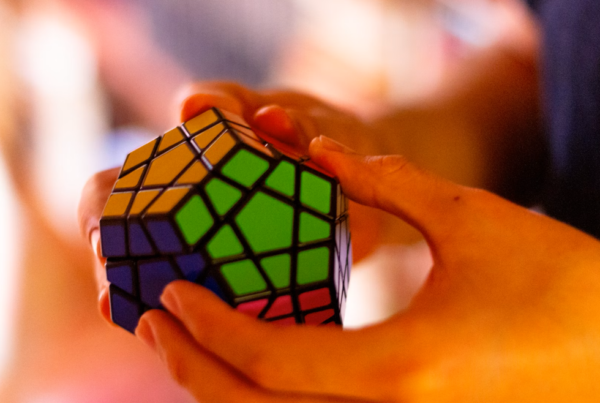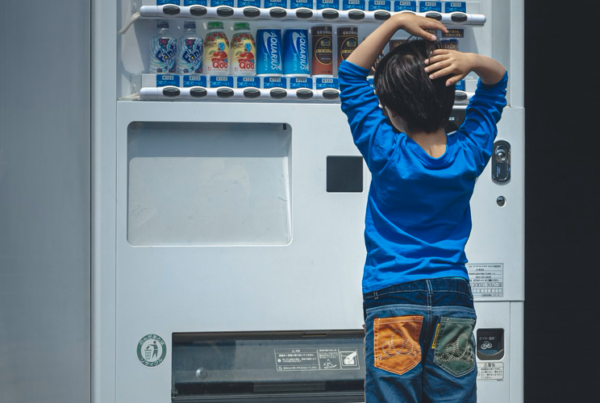


Bastiaan Rutjens’ (Social Psychology) question:
Dear Annemie,
I recently noticed an interesting behavior that my 16-months old daughter displays on a regular basis. She appears not yet ready to share toys, stuffed animals, etc. in joint play with others. If I’m not mistaken, this is normal behavior for children of her age. At daycare, she can be seen sitting next to her peers and playing, but they all play with their own toys. But, she does share one thing in particular, and that is food. When she is eating something, she regularly wants to share the meal with us. What causes this behavior? She obviously can’t infer that we are hungry since her theory of mind hasn’t been developed yet. Is she perhaps imitating our behavior of feeding her?
Bastiaan
Annemie Ploeger’s (Developmental Psychology) answer:
Dear Bastiaan,
Yes indeed, the food sharing of young children seems to be surprising behavior. Your question relates to a fundamental question in science: where does altruistic behavior come from? From an evolutionary perspective, it makes sense to keep everything for yourself in order to survive and thrive. But this is not what we observe; humans give away precious goods, even when nothing is expected in return. This appears to be unique to humans. For example, one of our closest genetic relatives, the chimpanzee, has trouble sharing food even with its own offspring. Chimpanzees definitely do not share food with strangers.
What do we know about food sharing in young children? A recent paper revealed that children as young as 19 months old, share food with strangers (Barragan et al., 2020). In the set-up of the study, a stranger accidently dropped fruit in a tray that was out of reach. It was found that 58% of the young children picked up the food and returned it to the stranger, compared to 4% in the control condition where a stranger intentionally threw the food in the tray. Even when the children were hungry (because the experiment took place right before their next meal), 38% returned the food compared to 0% in the control condition. In this experiment, the children clearly did not imitate the stranger, because the requested behavior was not demonstrated. Interestingly, children with siblings and those from collectivistic cultures returned more food, giving room for social interpretations of the results.
Another study examined young children in their sharing of five different toys and one food item with a stranger (Brownell et al., 2013). It was found that 8% of the 18-month-olds shared immediately without request, compared to 34% of the 24-month-olds. After a request, 53% of the 18-month-olds and 81% of the 24-month-olds showed sharing behavior. No significant difference was found between the sharing of toys and food for both age groups.
To conclude, sharing of food and toys is present in young children. Cooperation is at the base of human culture, so it makes sense that prosocial behavior develops at a very young age. So don’t worry, your daughter will start sharing toys soon!
Annemie
Annemie Ploeger’s question is for Hilde Geurts (Brain & Cognition):
Dear Hilde,
I remember a lecture (probably given by you) in which data were shown that were pretty remarkable. The data showed that autistic traits declined in people diagnosed with autism as they grew older, while people in the healthy population showed an increase in these traits. In the end, the two lines seemed to intersect, which would imply that people with and without autism are equally autistic at some point. I found this very fascinating! Since you have been researching this, I have two questions: Have you found this pattern in your own project? And how could you explain this pattern?’
Annemie
References
– Barragan et al., 2020. Altruistic food sharing behavior by human infants after a hunger manipulation. Scientific Reports, 10, 1785. https://doi.org/10.1038/s41598-020-58645-9.
– Brownell et al., 2013. Mine or yours? Development of sharing in toddlers in relation to ownership understanding. Child Development, 84(3), 906-920. https://doi.org/10.1111/cdev.12009.

Bastiaan Rutjens’ (Social Psychology) question:
Dear Annemie,
I recently noticed an interesting behavior that my 16-months old daughter displays on a regular basis. She appears not yet ready to share toys, stuffed animals, etc. in joint play with others. If I’m not mistaken, this is normal behavior for children of her age. At daycare, she can be seen sitting next to her peers and playing, but they all play with their own toys. But, she does share one thing in particular, and that is food. When she is eating something, she regularly wants to share the meal with us. What causes this behavior? She obviously can’t infer that we are hungry since her theory of mind hasn’t been developed yet. Is she perhaps imitating our behavior of feeding her?
Bastiaan

Annemie Ploeger’s (Developmental Psychology) answer:
Dear Bastiaan,
Yes indeed, the food sharing of young children seems to be surprising behavior. Your question relates to a fundamental question in science: where does altruistic behavior come from? From an evolutionary perspective, it makes sense to keep everything for yourself in order to survive and thrive. But this is not what we observe; humans give away precious goods, even when nothing is expected in return. This appears to be unique to humans. For example, one of our closest genetic relatives, the chimpanzee, has trouble sharing food even with its own offspring. Chimpanzees definitely do not share food with strangers.
What do we know about food sharing in young children? A recent paper revealed that children as young as 19 months old, share food with strangers (Barragan et al., 2020). In the set-up of the study, a stranger accidently dropped fruit in a tray that was out of reach. It was found that 58% of the young children picked up the food and returned it to the stranger, compared to 4% in the control condition where a stranger intentionally threw the food in the tray. Even when the children were hungry (because the experiment took place right before their next meal), 38% returned the food compared to 0% in the control condition. In this experiment, the children clearly did not imitate the stranger, because the requested behavior was not demonstrated. Interestingly, children with siblings and those from collectivistic cultures returned more food, giving room for social interpretations of the results.
Another study examined young children in their sharing of five different toys and one food item with a stranger (Brownell et al., 2013). It was found that 8% of the 18-month-olds shared immediately without request, compared to 34% of the 24-month-olds. After a request, 53% of the 18-month-olds and 81% of the 24-month-olds showed sharing behavior. No significant difference was found between the sharing of toys and food for both age groups.
To conclude, sharing of food and toys is present in young children. Cooperation is at the base of human culture, so it makes sense that prosocial behavior develops at a very young age. So don’t worry, your daughter will start sharing toys soon!
Annemie
Annemie Ploeger’s question is for Hilde Geurts (Brain & Cognition):
Dear Hilde,
I remember a lecture (probably given by you) in which data were shown that were pretty remarkable. The data showed that autistic traits declined in people diagnosed with autism as they grew older, while people in the healthy population showed an increase in these traits. In the end, the two lines seemed to intersect, which would imply that people with and without autism are equally autistic at some point. I found this very fascinating! Since you have been researching this, I have two questions: Have you found this pattern in your own project? And how could you explain this pattern?’
Annemie


